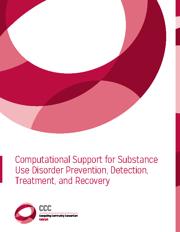A copy of this work was available on the public web and has been preserved in the Wayback Machine. The capture dates from 2020; you can also visit the original URL.
The file type is application/pdf.
Computational Support for Substance Use Disorder Prevention, Detection, Treatment, and Recovery
[article]
2020
arXiv
pre-print
Substance Use Disorders (SUDs) involve the misuse of any or several of a wide array of substances, such as alcohol, opioids, marijuana, and methamphetamine. SUDs are characterized by an inability to decrease use despite severe social, economic, and health-related consequences to the individual. A 2017 national survey identified that 1 in 12 US adults have or have had a substance use disorder. The National Institute on Drug Abuse estimates that SUDs relating to alcohol, prescription opioids, and
arXiv:2006.13259v1
fatcat:ioeqs2sxbngoblp2nj6debrjzm

